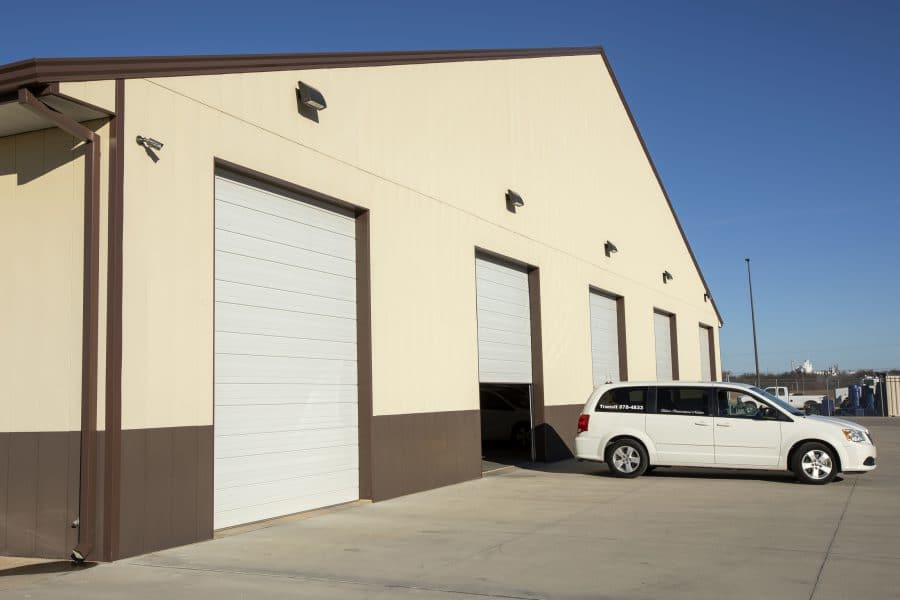A car is a necessity in almost all of Oklahoma, and public resources often fail to meet the need. Mass transit options remain rare, especially in rural areas like Pottawatomie County, where most of Citizen Potawatomi Nation’s land lies. Because of this, the Tribe attempts to fill some of the gaps with its transportation department.

“Administration saw a need,” said Transit Department Director Denise Smith. “A lot of people around here need rides, and they can’t afford it. Because we have a large elderly population. We have people that are low income, and (we) just decided to keep it a free ride, which is great. It helps out lots of people.”
The program offers rides between 8:30 a.m. and 4:30 p.m., Monday through Friday and focuses on helping people access necessities. As a curb-to-curb service, elderly and disabled individuals are encouraged to bring someone along to assist them between the vehicle and buildings if needed.
“Those who are trying to work and those who are trying to get to their medical appointments that need some help. … That’s who we want to help,” Smith said. “But, you know, there’s times that people have their cars break down, too. And they’ve called us and needed a ride, and we know how that is because we all drive.”
However, it is a public service, and the department welcomes anyone — Native and non-Native living within CPN’s jurisdiction — to schedule a ride. CPN Transit is not a non-emergency medical transport service.
30 years of service
Smith started with the Tribe nearly three decades ago as part of the Title VI elders’ program. In 1997, Title VI received its first transit grant from the Oklahoma Department of Human Services and purchased an ADA-compliant cutaway bus. The Vieux descendant began driving clients to visits with friends, the grocery store, social outings and more. She enjoyed helping them maintain their independence.
“Some of the elders that I’ve known for years still ride our system, and so I still get to talk to them,” Smith said. “Although I don’t get to see them every day, I still enjoy talking with them and catching up.”
They added a second bus in 1999, and things quickly progressed. By 2005, the Nation received grants from the Federal Transit Administration to expand its services beyond the Title VI elders’ program. Now, 29 years after she began at CPN, she still drives and dispatches when necessary and enjoys helping others get to work or taking them on errands.
“I just came in as a part-time person. Didn’t intend on staying very long, but I evidently did,” she said.
By the numbers
Currently, the transportation department has eight mini-vans, three of which are ADA compliant. It employs seven drivers as well as dispatchers who fill in as needed. To meet grant requirements, the drivers complete training through the FTA, National Rural Transit Assistance Program as well as ADA safety and transportation requirements. Their job also requires drug and alcohol safety training, and human trafficking training, which all apply to transportation.
“There’s a lot more to it,” Smith said. “You don’t just come here and just jump in the van and start driving it.”
In fiscal year 2019, the department provided more than 40,000 rides — an average of 22 rides per weekday, per van. The drivers spent nearly 22,000 hours on the road and logged more than 201,000 miles. Smith says most people find out about their services by word of mouth.
“I’ve told people about it when I’ve been out talking, and they’ve said, ‘Well… it’s hard for me to get a ride. I can’t depend on my kids,’ or whatever. I tell them, ‘Call! We do that,’” Smith said.
The department continues to grow. Right now, dispatch receives calls for approximately 35 rides a week that it is unable to fit into its schedule. Their service area covers roughly 40 square miles; however, out of town rides for medical appointments are available on an as-needed basis.
Life in the car
The drivers often foster personal connections with the riders they serve. On the road with clients, they compare hobbies and interests, talk about past jobs and teach each other new things. Many of the regulars know every person in the department.
“Most of the people we recognize their voice when they call, and they recognize our voices when one of us answers,” Smith said. “They know who we are, and I just like that personal aspect of it.”
Patrons occasionally bake cookies for the drivers during the holidays or send a box of candy to the office staff for Halloween. Some of them even know each other’s birthdays and exchange cards.
“(The drivers) become friends with some of them. And there’s some of them that whenever they get sick and stuff like that, the drivers will check on them on their off time. … If there’s services that they need that we may know about, then we can refer them,” Smith said.
“Although I didn’t plan on working here for the long term, I’m thankful for the opportunities I have been given here. I’ve seen our Tribe grow into a great place.”
Find more information about the CPN Transit Department, visit cpn.news/transportation or call 405-878-4833.
